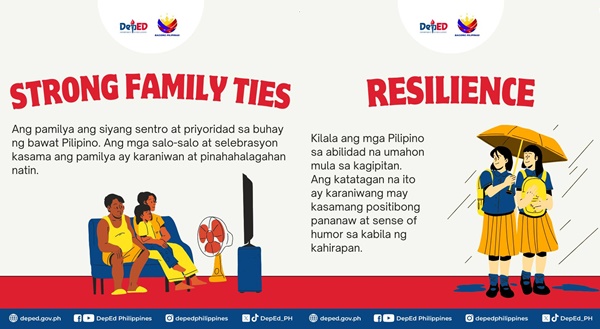The Department of Education (DepEd) shared four reminders about the Filipino values that students should learn.
This November marks the observance of Filipino Values Month.
“Ngayong Filipino Values Month, mahalagang matutunan ng ating mga mag-aaral ang mga Filipino values na di lamang humuhulma sa ating ugali kundi nagbibigay sa atin ng pagkakakilanlan at impluwensya kung paano tayo makipag-ugnayan sa mundo,” according to DepEd Philippines’ Facebook post.
According to DepEd, the four Filipino values that students need to learn are hospitality, respect for elders, strong family ties, and resilience.
Hospitality is a deeply ingrained value among Filipinos, reflecting their warm and generous nature. It is the act of making guests feel welcome, valued, and cared for, often going above and beyond to ensure their comfort and happiness. This cultural trait is expressed in various ways, such as offering food and drinks to visitors, providing a place to stay, and treating guests like family.
For Filipinos, hospitality is not just about politeness; it is a way of showing respect, gratitude, and the importance of relationships. Even in modest households, hosts will make an effort to serve their best, often apologizing if they feel they cannot offer enough, despite their generosity. This value is rooted in a communal spirit, where sharing and caring for others are prioritized.
Respect for elders is a cornerstone of Filipino culture, reflecting deep reverence for older generations. This value is expressed through gestures, language, and behavior that demonstrate humility and acknowledgment of the wisdom and experience of elders.
Filipinos often use honorifics like po and opo in conversation and practice gestures such as the mano (placing an elder’s hand on one’s forehead) as a sign of respect. Elders are often consulted for advice, and their opinions are highly valued in family and community matters.
In daily interactions, deference is shown by speaking in a polite tone, avoiding confrontational behavior, and giving priority to elders in social settings. This respect stems from the belief that elders have earned honor through their sacrifices and contributions to the family and society. It also reinforces the strong family ties and hierarchical structure that are central to Filipino culture.

Photo courtesy: DepEd Philippines (FB)
Strong family ties are a defining feature of Filipino culture, reflecting the deep bond and loyalty among family members. For Filipinos, family is the central unit of life, providing emotional, financial, and social support. This closeness extends beyond the nuclear family to include relatives like grandparents, aunts, uncles, and cousins, who are often considered part of the immediate family.
Filipinos prioritize family relationships over individual pursuits, often making sacrifices to support one another. For instance, parents work hard to provide their children with education and a better future, while children are expected to care for their aging parents in return. Celebrations, such as birthdays, holidays, and reunions, are typically family-centered, emphasizing togetherness.
Even when family members are geographically separated, such as overseas Filipino workers (OFWs), they maintain strong connections through regular communication and financial support, which they view as their duty. This emphasis on familial loyalty fosters a sense of belonging, security, and identity among Filipinos.
Resilience is a hallmark of the Filipino spirit, characterized by the ability to adapt, endure, and recover from challenges with strength and optimism. Despite facing natural disasters, economic hardships, or personal struggles, Filipinos exhibit a remarkable capacity to remain hopeful and determined.
This resilience is rooted in strong family ties, faith, and a communal support system. Filipinos often draw strength from their families and communities, working together to overcome adversity. Religious faith also plays a significant role, as many Filipinos turn to prayer and belief in a higher power for comfort and guidance during difficult times.

Photo courtesy: DepEd Philippines (FB)
Another aspect of Filipino resilience is the ability to find joy even in tough situations. Humor, positivity, and a lighthearted attitude are common ways Filipinos cope, helping them maintain a sense of normalcy and hope. This enduring quality not only helps individuals and communities recover but also fosters a collective spirit of perseverance and unity.











